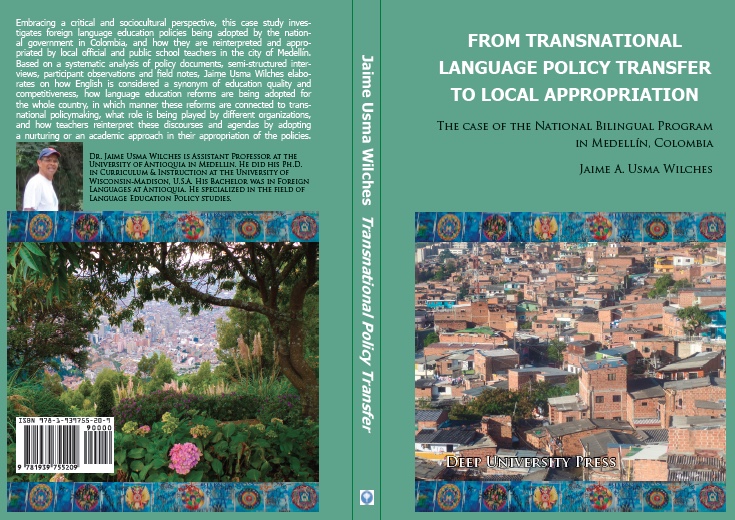FROM TRANSNATIONAL LANGUAGE POLICY TRANSFER TO LOCAL APPROPRIATION
The case of the National Bilingual Program in Medellín, Colombia
Dr. Jaime A. Usma Wilches

Globalization and Language and Education Reform in Colombia:
A Critical Outlook
Dr. Jaime Usma Wilches explores the connection between economic, political, and cultural globalization processes and recent education and language reforms in Colombia. Throughout his study, Usma attempts to demonstrate that current education and language policies in Colombia are tightly connected to transnational agendas and models of reform that do not necessarily represent a real benefit for the majority of the population, but, instead, may render privileges for a few. With this analysis, the author insists on the need for an equitable plan for the improvement of language teaching and learning in Colombia in a way that considers local priorities of economic development, respects local knowledge and culture, and accounts for a systemic and fundamental improvement of the public system based on the dissimilar conditions that affect schools, teachers, and students in both the private and the public sectors in the country.
A Critical Outlook
Dr. Jaime Usma Wilches explores the connection between economic, political, and cultural globalization processes and recent education and language reforms in Colombia. Throughout his study, Usma attempts to demonstrate that current education and language policies in Colombia are tightly connected to transnational agendas and models of reform that do not necessarily represent a real benefit for the majority of the population, but, instead, may render privileges for a few. With this analysis, the author insists on the need for an equitable plan for the improvement of language teaching and learning in Colombia in a way that considers local priorities of economic development, respects local knowledge and culture, and accounts for a systemic and fundamental improvement of the public system based on the dissimilar conditions that affect schools, teachers, and students in both the private and the public sectors in the country.

Embracing a critical and sociocultural perspective for the study of policy, this vertical case study investigates foreign language education policies being adopted by the national government in Colombia, and how they are reinterpreted and appropriated by local official and public school teachers in the city of Medellín. Based on a systematic analysis of policy documents, semi-structured interviews, participant observations and field notes, the author elaborates on how English is being emphasized as synonym of education quality and competitiveness in the country, how these language and education reforms are being adopted for the whole country, in which manner these models of reform are connected to transnational policymaking, what role is being played by different educational actors and organizations at the macro and micro level, and how, according to the multiple contextual factors that interplay in the continuous reinterpretation and final enactment of policy, teachers reinterpret these discourses and agendas by adopting a nurturing or an academic approach in their final appropriation of the initial policy texts. Additionally, this study highlights the unpredictable nature of policymaking processes, even when transnational organizations such as the British Council act as policy lenders and guarantors of success and credibility, and policy mandates are accompanied by standards, tests, frameworks, and timelines that do not necessarily respond to the local needs and expectations of local educational actors and communities. Finally, the author illustrates the multiple difficulties experienced by different schools communities across the city of Medellín, and how a breach between public and private institutions is created and fed as a consequence of the uneven conditions in which English as a foreign language is taught in Colombia and Medellín, which ends up creating a gap between the official discourse of innovation, competitiveness, education and bilingualism, and actual reality. In this manner, the study alerts about the multiple challenges faced by countries such as Colombia and cities like Medellín adopting imported discourse around education quality, competitiveness and bilingualism, and how these policy discourses may become simple slogans as educational communities lack the required conditions to successfully achieve the expected goals.
|
Jaime Usma has provided us with a wonderful critical sociocultural analysis of the realities of what happens on the ground when a language policy reform that is common throughout the world (the importation of English instruction as a path to greater prosperity and justice) is implemented by local educators in Medellin, Colombia. His analysis shows how the policies failed to respond to local needs and to live up to their promise of moving the system toward greater equity and social justice. He also shows how local education officials and teachers reinterpreted and appropriated the policies to support their own goals and efforts to bring about greater educational equity and justice. This book has important implications for examining language policies throughout the world, but it also offers an example of how scholars can use critical scholarship penetrate other slogans and policy rhetoric associated with the G.E.R.M. (Global Education Reform Movement) and unmask the realities of parachuting these neoliberal reforms into countries around the world. In the end, Usma’s analysis leaves us with hope about the ability of educators to interrupt and redirect aspects of these reforms.
Ken Zeichner Boeing Professor of Teacher Education University of Washington, USA This volume represents much needed scholarship in exploring the tensions between official language policies and their practical implementation on the ground. While these tensions have long been the interest of language policy studies, it is rare that scholars explore them through such rigorous and multilayered empirical research capturing the global and local. The comparative and critical lens applied here makes this volume an outstanding contribution to the field and provides invaluable insights for researchers, policy makers, curriculum planners and language teaching practitioners about language education in Columbia with lessons to be learnt far beyond. Anikó Hatoss University of New South Wales, Australia |
World wide there is a growing awareness that properly explanatory accounts of language education policy must fuse national and local perspectives, questions of structure and argument, evidence and debate and of course the various interests of the diverse players involved. Dr. Jaime Usma has made a notable contribution to this more sophisticated approach to LP with this excellent and internationally relevant analysis of Colombia's national government policy, the appropriation/adaptation of central policy in the city of Medellín, and the views, experiences and accounts of teachers, officials, experts and communities and transnational agencies. All in all an excellent and worthwhile volume.
Joseph Lo Bianco The University of Melbourne Australia Critical and comprehensive guide to contemporary Colombian educational legal framework for language teaching that brilliantly illustrates how language policies are instituted and how they are later appropriated by people in local places, particularly by teachers in Medellin schools. A study from a multi-layered perspective that provides readers with an insightful and highly topical discussion on foreign language policies and globalization. Carlos Maroto Guerola Universidade Federal de Santa Catarina Brazil Usma's book is much more than a nice rendition of how transnational language policies are being appropriated by government officials and other educational actors in Colombia. It is an enjoyable journey into Colombia's most recent political, socio-economic and educational reforms, and a compelling critical analysis of how those reforms are influencing school and classroom practices in Medellin. Doris Correa Universidad de Antioquia, Medellin, Colombia Jaime Usma's book does a magnificent work at dismantling one of the most pervasive grand narratives in globalized transnational foreign language policies: proficiency in English as one of the strongest pillars of a vibrant modern knowledge society, associated with higher economic gains for all. The author cogently demonstrates how transnational and national policymaking fails to properly address structural inequality, while being creatively reenacted by local schools and actors according towards a more just and humane society. Maria Alfredo Moreira University of Minho, Portugal |





